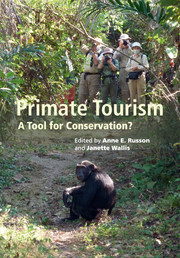Book contents
- Frontmatter
- Contents
- List of contributors
- Part I Introduction
- Part II Asian primates
- Part III African primates
- Part IV Neotropical primates
- Part V Broader issues
- 15 Economic aspects of primate tourism associated with primate conservation
- 16 Considering risks of pathogen transmission associated with primate-based tourism
- 17 Guidelines for best practice in great ape tourism
- Part VI Conclusion
- Index
- References
16 - Considering risks of pathogen transmission associated with primate-based tourism
from Part V - Broader issues
Published online by Cambridge University Press: 05 September 2014
- Frontmatter
- Contents
- List of contributors
- Part I Introduction
- Part II Asian primates
- Part III African primates
- Part IV Neotropical primates
- Part V Broader issues
- 15 Economic aspects of primate tourism associated with primate conservation
- 16 Considering risks of pathogen transmission associated with primate-based tourism
- 17 Guidelines for best practice in great ape tourism
- Part VI Conclusion
- Index
- References
Summary
Introduction
Sustainable, nature-based tourism should attempt to educate visitors about wildlife and the environment, while minimizing modification or degradation of the natural resources in the sites they visit. When possible, these activities should broadly benefit the social and natural environments by involving the participation of local communities (Ceballos-Lascuráin, 1996). And, if managed well, nature-based tourism should facilitate species conservation by raising the needed funds for wildlife and habitat conservation, while increasing public awareness of conservation issues. Unfortunately, rapid and unmonitored development of tourism projects in protected areas can produce deleterious effects on the very species we wish to conserve. Such risks may include habitat degradation caused by pollution and environmentally damaging development of infrastructure; animal crowding into restricted areas; and the introduction of invasive species.
These issues take on special importance when the species in question are (nonhuman) primates. Most wild populations of primates are relatively small and their reproductive cycles are protracted (with low reproductive rates relative to most mammals of similar size), so they are particularly vulnerable to population decreases, including those that result from human activities. Humans have contributed to significant population declines of wild primates through hunting and bushmeat consumption, habitat loss and fragmentation, and illegal capture of live primates for entertainment or other purposes. Tourism activities involving primates in their native habitat (including free-living rehabilitants as well as their wild counterparts) could benefit primate conservation but we must remain diligent about monitoring potential negative consequences, especially since primate tourism has been increasing in popularity over the past few decades. For example, the habituation to human presence essential to primate tourism may increase the likelihood that these animals will raid crops, invade garbage pits, and break into vehicles or lodgings for food. They may also become more vulnerable to poaching as a result of their loss of fear, their natural diet and ranging may become permanently altered, and their normal social behaviors may become altered (e.g. the appearance of a group of tourists may interrupt mating behaviors). Many of the chapters in this volume document these tourism impacts on the primates visited. Habituation could even lead to alterations in animal stress responses, possibly leading to immunosuppression with decreased reproductive success and increased susceptibility to infectious diseases (Muehlenbein, 2009; Muehlenbein et al., 2012).
- Type
- Chapter
- Information
- Primate TourismA Tool for Conservation?, pp. 278 - 291Publisher: Cambridge University PressPrint publication year: 2014
References
- 22
- Cited by

